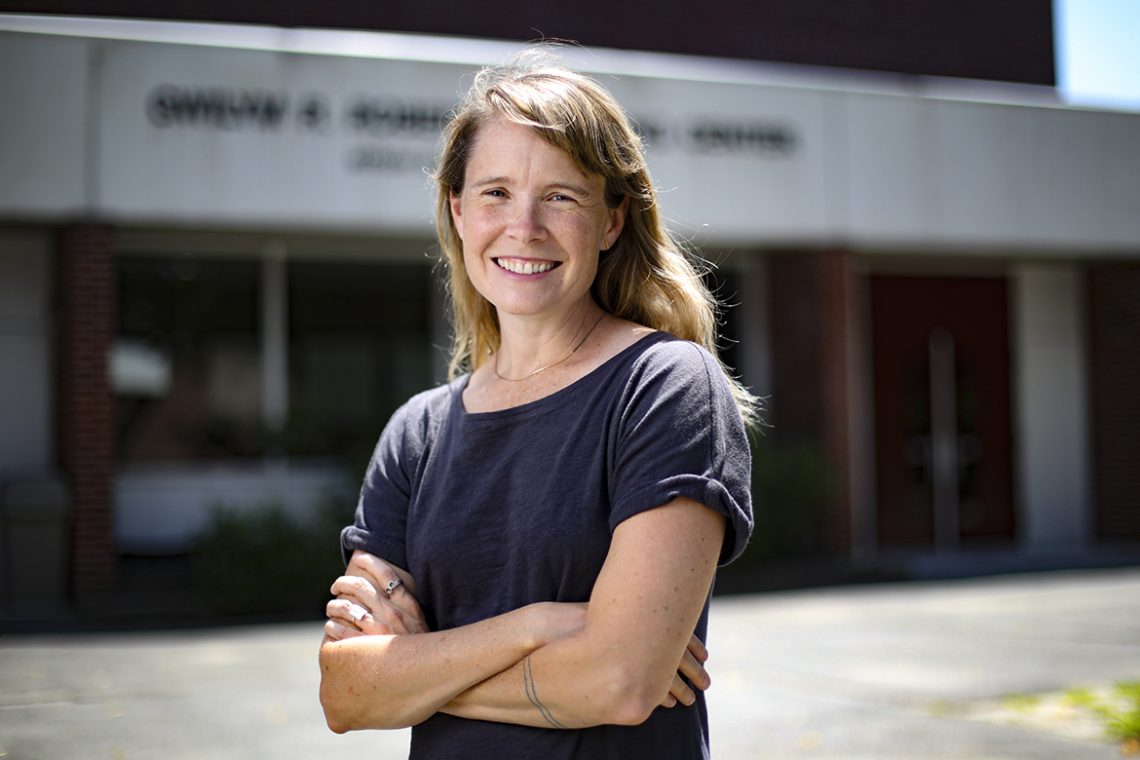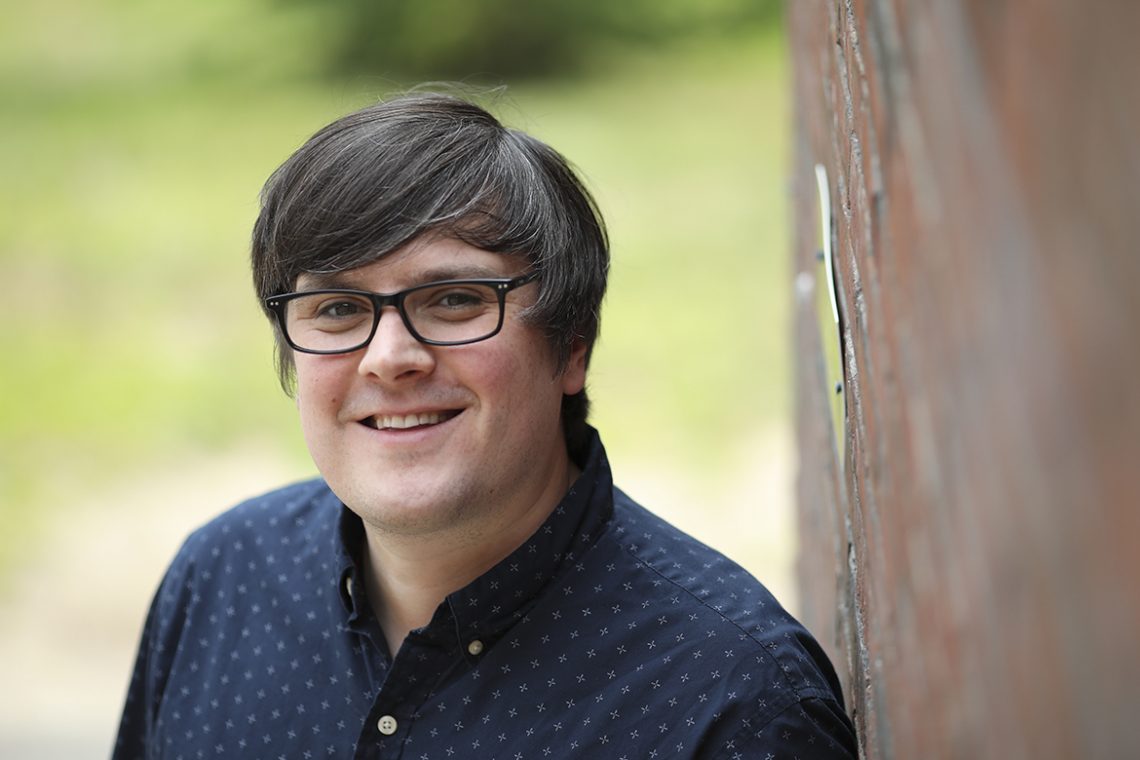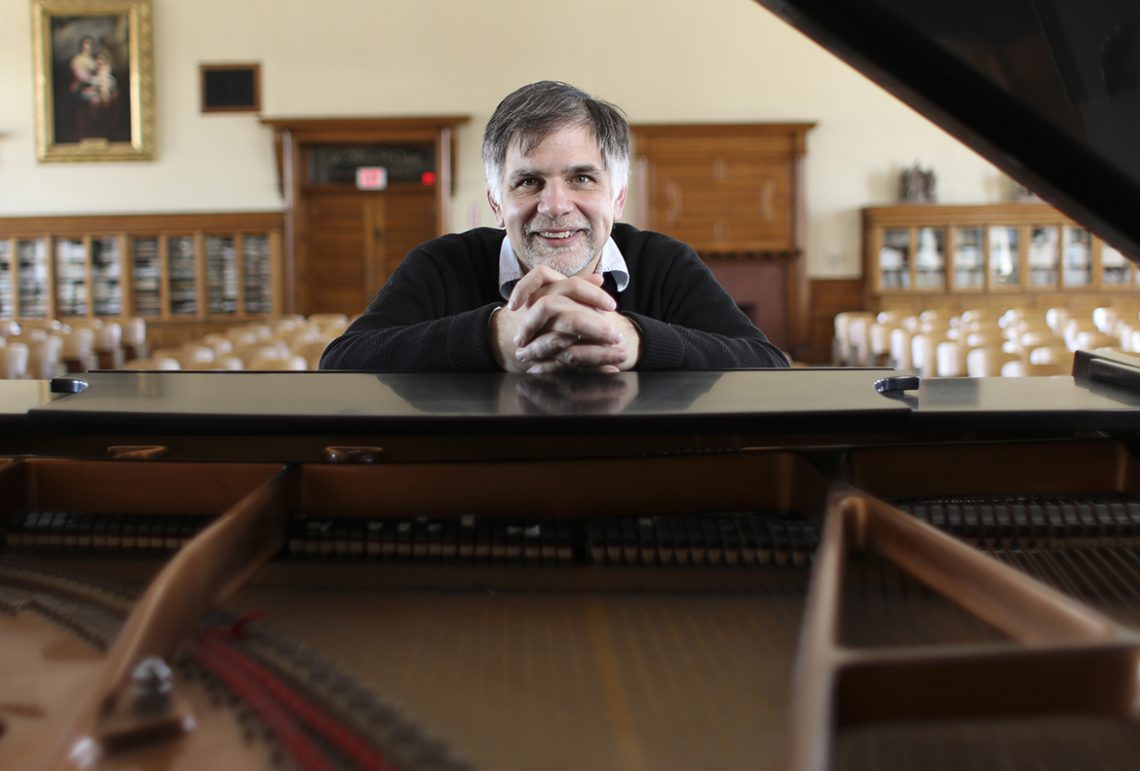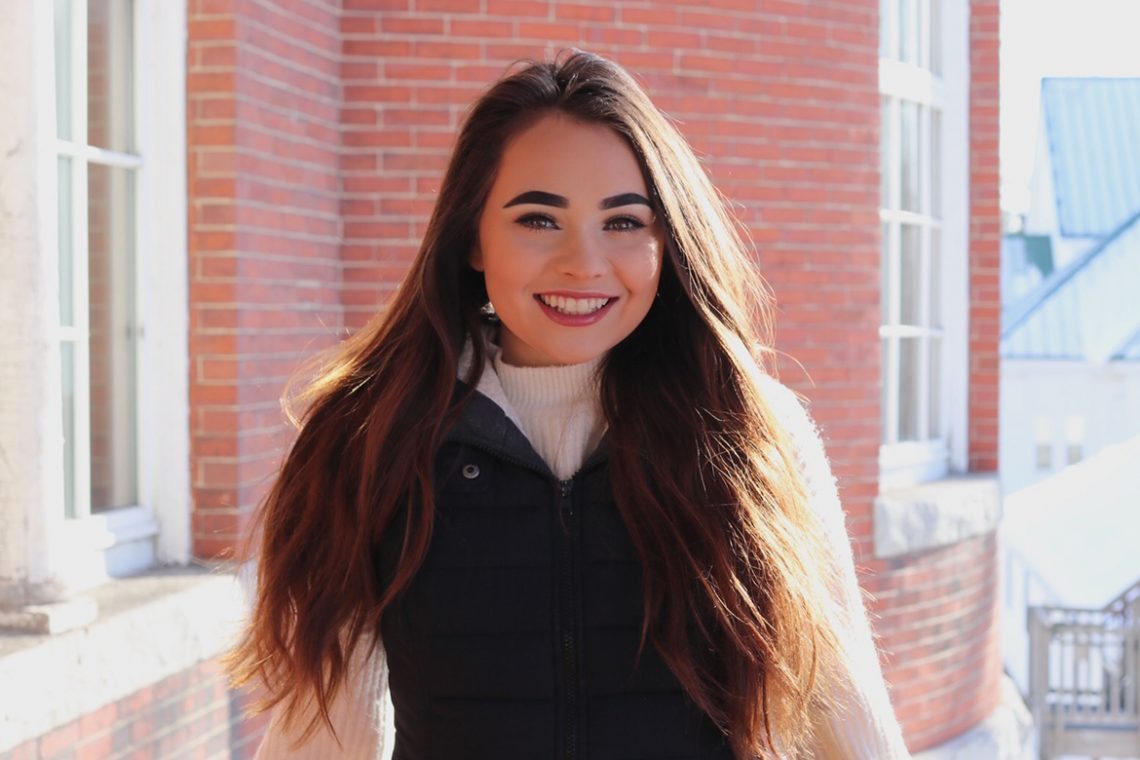As the five-year, $500,000 New Commons Project approaches the halfway mark at UMF, the community celebration of cultural works continues to grow.
By Grace McIntosh ’22, July 2019
It all started as a conversation.
Nearly two years ago, the Andrew W. Mellon Foundation approached UMF, challenging the University to incorporate into campus programming the Foundation’s mission to “strengthen, promote, and where necessary, defend the contributions of the humanities and the arts to human flourishing and to the well-being of diverse and democratic societies.”
In response, Kristen Case, associate professor of English, and Provost Eric Brown, asked the essential questions that would pave the way for expanding opportunities for campus enrichment: How can UMF incorporate public outreach and humanities? How can we do a better job engaging with the community? How can we offer a new definition or a new way of thinking about what our University does?

Along with tackling the answers, the Mellon grant provided the opportunity for the community to engage in conversations about works of art and culture across boundaries –– between UMF and the community.
When it came time to put all the pieces together, the New Commons Project emerged, and people statewide were encouraged to nominate their favorite works of art, music, literature, and entertainment.
The goal of the New Commons Project is to build a cultural commons for UMF and the people of Maine by twice in five years bringing together a collection of 24 cultural works proposed by students, faculty, and members of the community. These works, according to the project’s mission, are selected “on the basis of their potential value to the community.” From there, 12 finalists are chosen to become central assets in a canon of cultural works to be celebrated in special programming over the following year.
This year, the selected works included such disparate nominees ranging from Jane Austen’s novel Persuasion (1817) and Ludwig van Beethoven’s Symphony No. 6 (1808) to Kendrick Lamar’s Pulitzer prize-winning album DAMN. (2017) and Matt Groening’s television show The Simpsons (1989-present).

Kristen Case, co-director of the New Commons Project and associate professor of English at UMF. (Photo by Marc Glass.)
Case says the diversity of the New Commons Project nominees has provoked an exciting energy. The programming is designed to increase access to selected works through means of “public lectures, seminar-style discussions, an open access digital portal, and campus-generated community engagement projects.”
The usage of “commons” reflects the project’s mission statement: “A commons is something that belongs to all of us, a communally held resource, from which no one can be excluded, and for which we are all responsible.”
The Commons also has a related meaning: Since the 1600s most New England towns boasted a communally owned, central greenspace, where townspeople’s cattle grazed, militias mustered, and other collective activities took place. Since 2016, the New Commons Project has paid homage to this concept of a common space that serves all and enriches our collective well-being.
As they approach the third year and halfway mark of the New Commons Project, co-directors Case and Stephen Grandchamp, postdoctoral fellow of digital and public humanities, reflect on how this five-year project has successfully elevated arts and culture within UMF and the community.
In this phase, Grandchamp says the New Commons Project, “shifts away from professors defining what’s important to having a broader conversation with the community and students about what cultural works of art matter to them.” 
New Commons Project co-director and postdoctoral fellow of digital and public humanities Stephen Grandchamp. (Photo by Marc Glass.)
In explaining his enthusiasm for Kendrick Lamar’s DAMN. being chosen as a finalist, Grandchamp says, “Lamar was what I was most excited about, with an honorable mention for Persuasion, which is one of my favorite novels. But Austen is so frequently taught. I’ve had the opportunity to teach Persuasion in many courses, but our unit on Kendrick Lamar was a chance to explore something totally new.”
A West-Coast hip hop artist known for his platinum albums good kid, m.a.a.d city, To Pimp a Butterfly, and DAMN., Lamar has been applauded for his storytelling lyricism in raps that frequently explore his personal experiences growing up in Compton, Calif., amidst violence and racism.
In spring 2019, Grandchamp shared his vast knowledge of hip hop with an audience ranging from college freshmen to senior community members. In his seminar, “‘Ain’t a DAMN. Thing Changed’: Hip Hop’s History of Social Engagement,” Grandchamp articulated his thoughts on the Pulitzer Board’s choice of recognizing DAMN.
“While I applaud the boldness of the Pulitzer Board in awarding DAMN., as a longtime listener of hip hop I couldn’t help but recoil at the implication that its originality and novelty make it worthy of such an award. In fact, hip hop has been a constantly innovating musical force since the 1970s,” Grandchamp says. “ While DAMN. is a fantastic example of the genre, to confer its special status is to undervalue Lamar’s artistic antecedents — influences that I am sure Lamar would agree are no less striking or influential than his own work.”
The Mellon Foundation’s $500,000 grant to UMF allows for the New Commons to run its captivating program throughout each semester. “It’s incredible having the chance to bring to campus exceptional speakers and performers who we might not otherwise be able to,” says Case.
Along with hearing UMF’s very own Steven Pane, a professor of music and renowned concert pianist, play a transcription of Beethoven’s Symphony No. 6 (which took Pane a year to learn), the Philharmonic Boston Orchestra, conducted by Jinwood Park, also performed –– giving the community the unique experience of hearing the same piece of music performed in two completely different contexts. Both performances packed Nordica Auditorium with a diverse audience of eager listeners.

Renowned concert pianist and Professor of Music Stephen Pane performed Beethoven’s Symphony No. 6 in UMF’s Nordica Auditorium as part of the New Commons Project’s programming this past year. (Photo by Marc Glass.)
The project has made its way into the classroom as well. Grandchamp offered “Introduction to Digital Humanities,” a special topics English course looking at traditional literature and the various ways in which it’s been impacted by digital media. Students who have taken the course, says Granchamp, “become better cultural critics and analytical writers through direct engagement with literary texts and digital media.”
For one assignment, students read Henry David Thoreau’s 1854 text, Walden, and then considered the 2017 video game adaptation of the book. Students were asked how the video game relates to the original text through their cultural context.
“Students first read Walden to sharpen their analytical reading skills while also establishing a baseline understanding of Thoreau’s context, goals, and writing style,” explains Grandchamp. “Next, they experience the game in order to consider the manner by which digital adaptations of classic literature can re-contextualize and revitalize texts in our electronic era.”
It might be uncommon to hear “video games” and “Walden” in the same sentence; however, Grandchamp has found that pairing the two in this specific assignment helps students’ gain a better understanding of a difficult text.
“Walden, the game, allows for the virtual exploration of the geography, wildlife, plants, and people of Walden Pond,” he says. “As such, it makes the original 1854 text, which can often prove a difficult read for students, more comprehensible. The result is that students can learn about Thoreau’s philosophy in a more accessible way.”
Along with Digital Humanities, Grandchamp and Case team-teach a course offered every semester named after The New Commons.
“We have a project related to each of the works,” Grandchamp says. “For Kendrick Lamar, each student is creating a public Spotify playlist, in which they will create a curator statement that explains to the public why their playlist is important. The students will explain why each song is selected and sequenced, select a cover, and then send it out to the world.”
Different topics enjoy varying degrees of popularity among different crowds. However, one thing is certain: each event engenders a new level of understanding. “I hope that The New Commons has impacted UMF by engaging people to have conversations they might not otherwise have,” says Case.
The grant will continue to support programming for three more years, but Case is confident that with all the public engagement underway the New Commons Project will leave a lasting impact: “We’re hoping to build components from it into UMF well into the future.”
For those who have yet to avail themselves of the opportunity to nominate cultural works for consideration, Case and Grandchamp have this advice: Don’t hold back.
The central means of contributing is by submitting a video testimonial about one’s favorite cultural work through the project’s website, newcommonsproject.org. And for those who do not feel technologically savvy, Grandchamp and Case stand ready to assist with filming. Submitters may also simply mail a letter and be filmed anonymously or file submissions by text only.
Case says the impetus for using videos as the main form of submission is to start a conversation about culture with content that’s easily shareable via social media and the website. “Videos give more of a sense of people talking spontaneously and from the heart,” she says. “Through watching them, you not only learn about the work, you learn something about the person who has put forward the selection.”
On the cusp of its third year, the New Commons Project has become the catalyst for conversation about culture within the community. As the New Commons grows, the engagement expands, reaching people near and far, fostering new thinking and new perspectives. As the programming continues, it is evident that the New Commons Project will continue to provide a platform where the voices of all people will be heard, and where art of all different kinds will be shared.
About the author

Grace McIntosh ’22, editorial assistant for Farmington First, is a rising sophomore from Farmington, Maine. She enjoys documenting the life of the University and sharing her accounts with the UMF alumni community. (Photo by Brandon Cardona ’20.)

